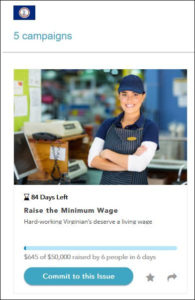 Samantha Biggio and Heidi Drauschak, both recent University of Richmond law school grads, had an idea for a new business, and they raised $35,000 through the crowd-funding Kickstarter website to fund it. Their business idea? To launch a website, Crowdlobby… where people can raise money through crowd funding to launch lobbying initiatives.
Samantha Biggio and Heidi Drauschak, both recent University of Richmond law school grads, had an idea for a new business, and they raised $35,000 through the crowd-funding Kickstarter website to fund it. Their business idea? To launch a website, Crowdlobby… where people can raise money through crowd funding to launch lobbying initiatives.
The idea has obvious appeal. The legislative process in Washington, D.C., and state legislatures across the country is dominated by big-money special interests — corporations, unions, advocacy groups — that can afford to hire lobbyists. Individual citizens may share common goals but they aren’t organized enough to raise the kind of money they need to engage a pro.
The Crowdlobby website allows visitors to browse active fund-raising campaigns, submit their own campaigns, commit funds, and select lobbyists. As with other crowd-funding sites, donors are not charged unless the fund-raising objective is reached. Crowdlobby keeps 25% of the proceeds for its role in vetting campaigns, vetting lobbyists, maintaining the website and covering other overhead costs.
The website is just getting off the ground, so at this point it has only nine active fund-raising efforts going on — five in Richmond, three in Washington, D.C., and one in New York. Based on current activity, it may be a long time before anyone sees any tangible results. After six days the most successful fund-raiser so far — to raise Virginia’s minimum wage — has garnered $650 in commitments. Out of $50,000. But the campaign still has 84 days to go.
One Virginia campaign seeks to rejigger the state education funding formula to steer more money to districts with low-income students. Another would decriminalize marijuana. Yet another would lobby for the creation of an independent redistricting commission. And a fifth would lift the 1% cap on the amount of energy that could be generated through the net-metering program. So far, five people have committed a grand total of $31 to support that last one.
Americans have a constitutional right to petition government. In the abstract, the idea of democratizing access to lobbying talent has great appeal. But I’m thinking that Crowdlobby needs to go back to the fund-raising well for a second round of financing to upgrade its website.
The campaign-submission template asks would-be campaigners to provide background information about the issue, a description of the proposed legislation, a history of the issue, polling data, and endorsements. I see no mechanism to include white papers, backgrounders, videos, graphs, charts, spreadsheets, databases or other documentation in support of their position — or even to direct potential donors to a website or other social media with more information. Individual citizens aren’t going to get anywhere on this website because Crowdlobby is unlikely to ever generate the volume of traffic needed to attract hundreds of small donors. This tool could be used by citizen groups who are already utilizing email, social media and other tools to get the word out. If citizens groups — #MeToo, Tea Party groups, whatever — are already doing the heavy lifting, though, will they be willing to part with 25% of what they raise?
Perhaps the most obvious flaw in the model is that the fund-raising profiles don’t say who is behind the appeal. Once money is raised, someone has to call the shots. Who is that person? If you’re receptive to the idea of donating $100 or $200, who are you entrusting your money to? Who is in charge of framing detailed instructions to the lobbyist? Who makes the decisions when tactical decisions, compromises, and amendments are called for? There is no way to know. Donors are buying a pig in a poke.
I wish Biggio and Drauschak the best of luck because I would love for Virginia citizens to be empowered to participate in the legislative process. I could see Bacon’s Rebellion potentially using crowdsourcing to lobby for more transparency and openness in government. But I would not use Crowdlobby in its current incarnation. The website doesn’t look like it’s ready yet for prime time.
Update: Heidi Drauschak responds to this post, adding details on changes Crowdlobby is making to the website — in particular, describing the mechanism by which a majority of donors will direct lobbyist activities.


